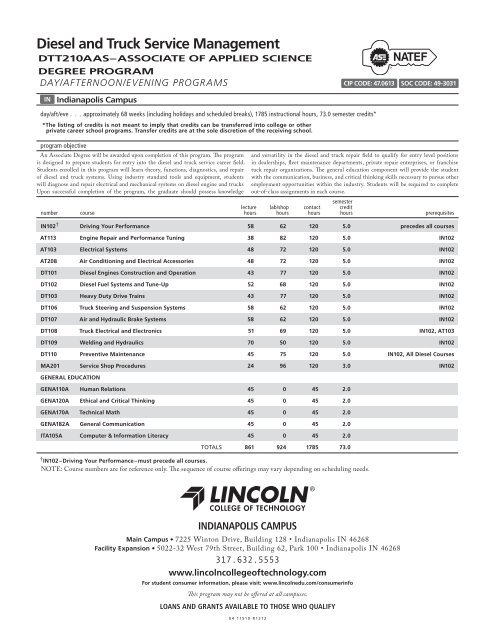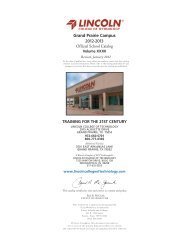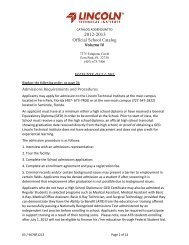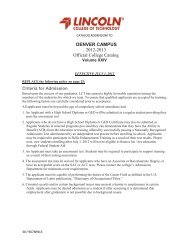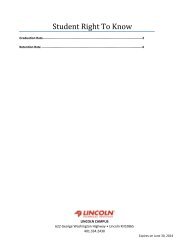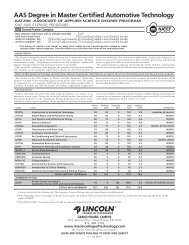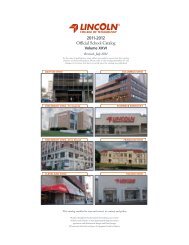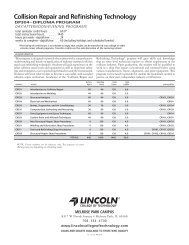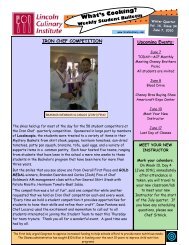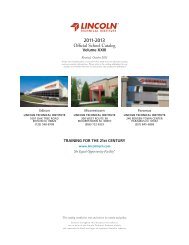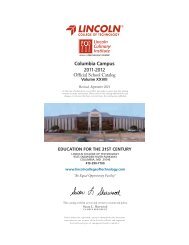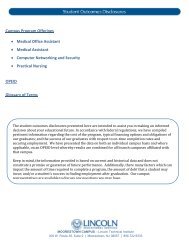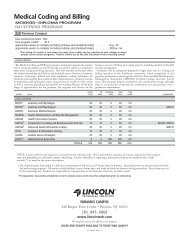to download the PDF - Lincoln Technical Institute
to download the PDF - Lincoln Technical Institute
to download the PDF - Lincoln Technical Institute
Create successful ePaper yourself
Turn your PDF publications into a flip-book with our unique Google optimized e-Paper software.
Diesel and Truck Service Management<br />
dtt210aAs–associate of Applied science<br />
degree Program<br />
day/afternoon/Evening programs<br />
CIP Code: 47.0613 SOC Code: 49-3031<br />
IN Indianapolis Campus<br />
day/aft/eve . . . approximately 68 weeks (including holidays and scheduled breaks), 1785 instructional hours, 73.0 semester credits*<br />
*The listing of credits is not meant <strong>to</strong> imply that credits can be transferred in<strong>to</strong> college or o<strong>the</strong>r<br />
private career school programs. Transfer credits are at <strong>the</strong> sole discretion of <strong>the</strong> receiving school.<br />
program objective<br />
An Associate Degree will be awarded upon completion of this program. The program<br />
is designed <strong>to</strong> prepare students for entry in<strong>to</strong> <strong>the</strong> diesel and truck service career field.<br />
Students enrolled in this program will learn <strong>the</strong>ory, functions, diagnostics, and repair<br />
of diesel and truck systems. Using industry standard <strong>to</strong>ols and equipment, students<br />
will diagnose and repair electrical and mechanical systems on diesel engine and trucks<br />
Upon successful completion of <strong>the</strong> program, <strong>the</strong> graduate should possess knowledge<br />
and versatility in <strong>the</strong> diesel and truck repair field <strong>to</strong> qualify for entry level positions<br />
in dealerships, fleet maintenance departments, private repair enterprises, or franchise<br />
tuck repair organizations. The general education component will provide <strong>the</strong> student<br />
with <strong>the</strong> communication, business, and critical thinking skills necessary <strong>to</strong> pursue o<strong>the</strong>r<br />
employment opportunities within <strong>the</strong> industry. Students will be required <strong>to</strong> complete<br />
out-of-class assignments in each course.<br />
semester<br />
lecture lab/shop contact credit<br />
number course hours hours hours hours prerequisites<br />
IN102 † Driving Your Performance 58 62 120 5.0 precedes all courses<br />
AT113 Engine Repair and Performance Tuning 38 82 120 5.0 IN102<br />
AT103 Electrical Systems 48 72 120 5.0 IN102<br />
AT208 Air Conditioning and Electrical Accessories 48 72 120 5.0 IN102<br />
DT101 Diesel Engines Construction and Operation 43 77 120 5.0 IN102<br />
DT102 Diesel Fuel Systems and Tune-Up 52 68 120 5.0 IN102<br />
DT103 Heavy Duty Drive Trains 43 77 120 5.0 IN102<br />
DT106 Truck Steering and Suspension Systems 58 62 120 5.0 IN102<br />
DT107 Air and Hydraulic Brake Systems 58 62 120 5.0 IN102<br />
DT108 Truck Electrical and Electronics 51 69 120 5.0 IN102, AT103<br />
DT109 Welding and Hydraulics 70 50 120 5.0 IN102<br />
DT110 Preventive Maintenance 45 75 120 5.0 IN102, All Diesel Courses<br />
MA201 Service Shop Procedures 24 96 120 3.0 IN102<br />
GENERAL EDUCATION<br />
GENA110A Human Relations 45 0 45 2.0<br />
GENA120A Ethical and Critical Thinking 45 0 45 2.0<br />
GENA170A <strong>Technical</strong> Math 45 0 45 2.0<br />
GENA182A General Communication 45 0 45 2.0<br />
ITA105A Computer & Information Literacy 45 0 45 2.0<br />
TOTALS 861 924 1785 73.0<br />
† IN102 – Driving Your Performance – must precede all courses.<br />
NOTE: Course numbers are for reference only. The sequence of course offerings may vary depending on scheduling needs.<br />
INDIANAPOLIS CAMPUS<br />
Main Campus • 7225 Win<strong>to</strong>n Drive, Building 128 • Indianapolis IN 46268<br />
Facility Expansion • 5022-32 West 79th Street, Building 62, Park 100 • Indianapolis IN 46268<br />
317.632.5553<br />
www.lincolncollegeoftechnology.com<br />
For student consumer information, please visit: www.lincolnedu.com/consumerinfo<br />
This program may not be offered at all campuses.<br />
loans and grants available <strong>to</strong> those who qualify<br />
04 11510 R1212
course descriptions<br />
IN102 – Driving Your Performance<br />
120 Contact Hrs (58 Lecture, 62 Lab/Shop); 5.0 Credits<br />
The overall goal of this course is <strong>to</strong> facilitate a smooth transition <strong>to</strong> school by engaging <strong>the</strong> student<br />
in curriculum focusing on academic, career, and life skills. Students will make connections with key<br />
personnel within <strong>the</strong> school that will assist with <strong>the</strong>ir questions and provide guidance throughout<br />
<strong>the</strong>ir education.<br />
The student will be introduced <strong>to</strong> au<strong>to</strong>motive systems, industry certifications, and job opportunities.<br />
Students will learn essential skills for <strong>the</strong> vehicle technician including safety, equipment<br />
fundamentals, and <strong>the</strong> proper use of measurement <strong>to</strong>ols such as dial indica<strong>to</strong>rs, micrometers, and<br />
calipers.<br />
The au<strong>to</strong>motive content will be balanced by an emphasis on skills that will enable students <strong>to</strong> be<br />
successful in school and in life. These skills will include time management, financial management,<br />
goal setting, learning strategies, career planning, and critical thinking strategies.<br />
Prerequisite: IN102 Must precede all au<strong>to</strong>motive/diesel courses.<br />
AT113 – Engine repair and performance tuning<br />
120 Contact Hrs (38 Lecture, 82 Lab/Shop); 5.0 Credits<br />
The focus of this course is <strong>to</strong> provide <strong>the</strong> student with a detailed study of <strong>the</strong> modern internal<br />
combustion gasoline engine from <strong>the</strong> basic principles of design and operation <strong>to</strong> inspection,<br />
precision measurement, fitting, and reconditioning, <strong>to</strong> include engine block, cylinder heads, valve<br />
train, cooling systems, coolants, lubricating systems, and engine lubricants. Students will learn<br />
how <strong>to</strong> complete repair orders containing cus<strong>to</strong>mer and vehicle information and corrective action.<br />
Students will learn how <strong>to</strong> research vehicle service information with computer and internet based<br />
electronic retrieval systems. Students learn how <strong>to</strong> diagnose various engine concerns through visual<br />
and audi<strong>to</strong>ry inspection. Students will properly disassemble, inspect, measure, troubleshoot, service,<br />
and reassemble a gasoline engine. Dual Overhead Cam (DOHC) engines are featured in this<br />
course with focus on cylinder heads and design, camshafts, and valve trains. Valve timing strategies<br />
are emphasized concerning increased performance.<br />
Students will learn how <strong>to</strong> properly select and install manufacturer’s and aftermarket bolt-on<br />
engine components <strong>to</strong> achieve optimum performance. Students will utilize computers and<br />
simulation software <strong>to</strong> select engine components and identify characteristics and benefits of various<br />
part combinations. Students test engine component combinations in a simulated environment<br />
prior <strong>to</strong> assembly. During engine assembly, students properly identify, select, and utilize a variety of<br />
parts <strong>to</strong> achieve desired enhancements. Students will setup and conduct engine testing utilizing a<br />
dynamometer <strong>to</strong> demonstrate increased output and performance.<br />
Prerequisite: IN102<br />
AT103 – Electrical Systems<br />
120 Contact Hrs (48 Lecture, 72 Lab/Shop); 5.0 Credits<br />
This course is designed <strong>to</strong> provide <strong>the</strong> student with practical <strong>the</strong>ory in basic and solid state circuitry,<br />
including body electrical systems, operation and service of au<strong>to</strong>motive s<strong>to</strong>rage batteries, au<strong>to</strong>mobile<br />
charging systems, starting systems, and lighting systems. Students will evaluate components using<br />
both conventional and electronic diagnostic equipment.<br />
Students will learn how <strong>to</strong> complete repair orders containing cus<strong>to</strong>mer and vehicle information and<br />
corrective action. Students will learn how <strong>to</strong> research vehicle service information with computer<br />
and internet based electronic retrieval systems.<br />
Students will learn how <strong>to</strong> diagnose basic electrical, charging, starting, and lighting circuits through<br />
<strong>the</strong> use of diagnostic equipment <strong>to</strong> include test lights, multimeters, and continuity testers.<br />
Prerequisite: IN102<br />
AT208 – Air Conditioning and Electrical Accessories<br />
120 Contact Hrs (48 Lecture, 72 Lab/Shop); 5.0 Credits<br />
This course is designed <strong>to</strong> provide <strong>the</strong> student with <strong>the</strong>ory and application of au<strong>to</strong>mobile air<br />
conditioning and heating systems. Students will also be presented with <strong>the</strong> operation of various<br />
au<strong>to</strong>mobile accessories <strong>to</strong> include: power windows, door locks, and seats, and air bag operation<br />
and service.<br />
Students will learn how <strong>to</strong> complete repair orders containing cus<strong>to</strong>mer and vehicle information and<br />
corrective action. Students will learn how <strong>to</strong> research vehicle service information with computer<br />
and internet based electronic retrieval systems.<br />
Students will learn how <strong>to</strong> diagnose abnormal operation of air conditioning and heating systems,<br />
remove and replace air conditioning and heating system components, and evacuate and recharge<br />
au<strong>to</strong>mobile air conditioning systems.<br />
Prerequisite: IN102<br />
DT101 – Diesel Engines Construction and Operation<br />
120 Contact Hrs (43 Lecture, 77 Lab/Shop); 5.0 Credits<br />
This course is designed <strong>to</strong> provide <strong>the</strong> student with <strong>the</strong> knowledge and skills necessary <strong>to</strong> service<br />
medium and heavy duty diesel engines. Instruction on <strong>the</strong> operating principles, construction, design<br />
variations, and applications of <strong>the</strong> diesel engines are emphasized.<br />
The student will learn how <strong>to</strong> perform a complete disassembly and assembly of <strong>the</strong> diesel engine,<br />
<strong>to</strong> include <strong>the</strong> cylinder head, block and timing gears, by using <strong>the</strong> instructions in <strong>the</strong> engine’s<br />
manufacturers service manual. They will also learn <strong>the</strong> proper methods of inspecting, identifying<br />
and naming <strong>the</strong> components <strong>to</strong> determine serviceability of <strong>the</strong> components prior <strong>to</strong> making a<br />
repair. This will include learning how <strong>to</strong> make all <strong>the</strong> necessary precision measurements required<br />
for diagnosing component failure prior <strong>to</strong> servicing and repair of <strong>the</strong> engine.<br />
The student will learn how <strong>to</strong> service, repair and diagnose <strong>the</strong> cooling and lubricating system of<br />
diesel engines. The student will learn <strong>the</strong> different types of coolants as well as additives and how<br />
<strong>to</strong> test for Supplemental Coolant Additives (SCA) <strong>to</strong> determine if additions <strong>to</strong> or replacement is<br />
needed. Students will learn how <strong>to</strong> perform coolant tests with different testing equipment.<br />
Students will learn how <strong>to</strong> research vehicle service information with computer and internet based<br />
electronic retrieval systems.<br />
Prerequisite: IN102<br />
Diesel and Truck Service Management – DTT210AAS AAS Degree Program<br />
DT102 – Diesel Fuel Systems and Tune-Up<br />
120 Contact Hrs (52 Lecture, 68 Lab/Shop); 5.0 Credits<br />
This course is designed <strong>to</strong> provide <strong>the</strong> student with <strong>the</strong> knowledge and skills necessary <strong>to</strong> service<br />
fuel systems found on diesel powered truck trac<strong>to</strong>rs. The student will learn how <strong>to</strong> perform<br />
maintenance, service and repair on diesel fuel systems such as <strong>the</strong> Common Rail System,<br />
Detroit Diesel Electronic Controls (DDEC), different Cummins Systems, and International<br />
HEUI systems. The student will learn how <strong>to</strong> perform tune-ups on diesel engines by following<br />
manufacturer’s service procedures and specifications.<br />
The student will learn how <strong>to</strong> identify <strong>the</strong> different exhaust compounds from a diesel engine<br />
and define <strong>the</strong> ones that are classified as pollutants. The student will learn about <strong>the</strong> various<br />
manufacturers’ exhaust aftertreatment systems. The student will learn how <strong>to</strong> perform an opacity<br />
smoke test and correlate <strong>the</strong> test results <strong>to</strong> engine performance and possible component failure.<br />
Students will learn how <strong>to</strong> research vehicle service information with computer and internet based<br />
electronic retrieval systems.<br />
Prerequisite: IN102<br />
DT103 – Heavy Duty Drive Trains<br />
120 Contact Hrs (43 Lecture, 77 Lab/Shop); 5.0 Credits<br />
This course is designed <strong>to</strong> provide <strong>the</strong> student with <strong>the</strong> knowledge and skills necessary <strong>to</strong> service<br />
<strong>the</strong> drive trains found on diesel powered truck trac<strong>to</strong>rs. The student will learn how <strong>to</strong> identify <strong>the</strong><br />
components of a heavy duty clutch system. Students will learn how <strong>to</strong> diagnose a clutch system<br />
for wear and damage and give <strong>the</strong> possible causes of specific clutch defects. The student will learn<br />
how <strong>to</strong> remove and replace a heavy duty truck clutch system.<br />
The student will learn how <strong>to</strong> identify and describe <strong>the</strong> various gear designs and shift mechanisms<br />
used in heavy duty trucks. The student will also learn how <strong>to</strong> calculate both <strong>the</strong> gear pitch and<br />
gear ratios in a heavy duty drive line. The student will learn how <strong>to</strong> disassemble and reassemble a<br />
heavy duty transmission, differential and power divider as well as learning how <strong>to</strong> service <strong>the</strong> heavy<br />
duty drive line components in maintaining <strong>the</strong> correct lubricant and <strong>the</strong> level of lubricant in <strong>the</strong><br />
system. The student will also learn how <strong>to</strong> perform basic diagnostic procedures on an au<strong>to</strong>mated<br />
standard transmission.<br />
Students will learn how <strong>to</strong> research vehicle service information with computer and internet based<br />
electronic retrieval systems.<br />
Prerequisite: IN102<br />
DT106 – Truck Steering and Suspension Systems<br />
120 Contact Hrs (58 Lecture, 62 Lab/Shop); 5.0 Credits<br />
This course is designed <strong>to</strong> provide <strong>the</strong> student with <strong>the</strong> knowledge and skills necessary <strong>to</strong> service<br />
heavy duty truck steering and suspension systems. The student will learn how <strong>to</strong> identify, diagnosis,<br />
service, repair, and adjust as necessary; <strong>the</strong> components of a heavy duty truck steering system <strong>to</strong><br />
include <strong>to</strong>e-in, camber, caster, axle inclination, turning radius and axle alignment and how <strong>the</strong>y<br />
affect tire wear, directional stability and handling. The student will learn how <strong>to</strong> balance truck tires<br />
and wheels and perform a wheel alignment <strong>to</strong> include <strong>the</strong> rear axle(s) by using computerized wheel<br />
alignment equipment<br />
The student will learn how <strong>to</strong> service <strong>the</strong> major tire and wheel configurations used on heavy duty<br />
trucks. Students will learn how <strong>to</strong> perform bearing and seal service on both grease lubricated<br />
and oil lubricated front and rear hubs. The student will learn how <strong>to</strong> perform <strong>the</strong> basic checks<br />
for frame alignment and geometry and how <strong>the</strong> frame and chassis components are repaired. The<br />
student will learn how <strong>to</strong> service, repair and replace if necessary, <strong>the</strong> components on <strong>the</strong> four types<br />
of suspension systems.<br />
Students will learn how <strong>to</strong> research vehicle service information with computer and internet based<br />
electronic retrieval systems.<br />
Prerequisite: IN102<br />
DT107 – Air and Hydraulic Brake Systems<br />
120 Contact Hrs (58 Lecture, 62 Lab/Shop); 5.0 Credits<br />
This course has been designed <strong>to</strong> provide comprehensive information on air and hydraulic brake<br />
systems as <strong>the</strong>y apply <strong>to</strong> medium heavy duty transport vehicles. The student will learn <strong>to</strong> identify,<br />
locate, and diagnose <strong>the</strong> components of <strong>the</strong> truck brake systems, as it applies <strong>to</strong> hydraulic, air over<br />
hydraulic, or air brake systems. The student will learn <strong>to</strong> perform maintenance, service, and repair<br />
of brake system components on medium and heavy duty truck.<br />
The student will learn <strong>to</strong> identify, locate, diagnose, service, and repair as necessary, components of<br />
ABS, EBS systems on a heavy duty truck and trailer. The student will learn <strong>to</strong> use LED lights<br />
and blink codes <strong>to</strong> assist <strong>the</strong>m in diagnosing problems with <strong>the</strong> ABS, EBS systems. The student<br />
will learn how <strong>to</strong> perform maintenance, service, repair, and overhaul of disc and drum brakes as<br />
it applies <strong>to</strong> hydraulic, air over hydraulic, and air brake systems found on medium and heavy duty<br />
trucks.<br />
Students will learn how <strong>to</strong> research vehicle service information with computer and internet based<br />
electronic retrieval systems.<br />
Prerequisite: IN102<br />
DT108 – Truck Electrical and Electronics<br />
120 Contact Hrs (51 Lecture, 69 Lab/Shop); 5.0 Credits<br />
This course is designed <strong>to</strong> provide <strong>the</strong> student with <strong>the</strong> necessary skills and knowledge required<br />
<strong>to</strong> identify, service, and repair <strong>the</strong> different types of electrical and electronic circuits found on late<br />
model medium and heavy duty trucks. Operation, diagnosis, and service of <strong>the</strong> trucks computer<br />
systems will be emphasized.<br />
The student will learn <strong>to</strong> apply Ohm’s law <strong>to</strong> series, parallel and series-parallel circuits and how data<br />
is transmitted from <strong>the</strong> various engine, body, and electronic system sensors <strong>to</strong> onboard computers<br />
that control fuel management, driveability performance, and driver comfort systems.<br />
The student will learn how <strong>to</strong> diagnose and service electrical and electronic systems using wiring<br />
diagrams, manufacturer service manuals, and specialized diagnostic equipment. The student will<br />
learn how <strong>to</strong> properly identify, disassemble, repair as necessary, and assemble connec<strong>to</strong>rs and wiring<br />
on medium and heavy duty trucks.<br />
Students will learn how <strong>to</strong> research vehicle service information with computer and internet based<br />
electronic retrieval systems.<br />
Prerequisites: IN102, AT103
course descriptions<br />
DT109 – Welding and Hydraulics<br />
120 Contact Hrs (70 Lecture, 50 Lab/Shop); 5.0 Credits<br />
This course is an introduction <strong>to</strong> welding and basic hydraulics. The student will learn how <strong>to</strong><br />
take <strong>the</strong> necessary safety precautions as <strong>the</strong>y pertain <strong>to</strong> cutting, welding and hydraulics. They will<br />
learn how <strong>to</strong> weld with a MIG welder. The student will also learn how <strong>to</strong> use an oxyacetylene<br />
combination <strong>to</strong>rch <strong>to</strong> cut metal.<br />
The student will learn how <strong>to</strong> diagnose <strong>the</strong> basic operation of a hydraulic system <strong>to</strong> include giving a<br />
description of <strong>the</strong> operation and <strong>the</strong> diagnostic procedures for all of <strong>the</strong> components in a hydraulic<br />
system. The student will study Pascal’s Law and <strong>the</strong> Bernoulli’s Principle of hydraulics as <strong>the</strong>y<br />
pertain <strong>to</strong> <strong>the</strong> repair industry. The student will learn how <strong>to</strong> properly repair <strong>the</strong> basic hydraulic<br />
system in a hydraulic shop.<br />
Students will learn how <strong>to</strong> research vehicle service information with computer and internet based<br />
electronic retrieval systems.<br />
Prerequisite: IN102<br />
DT110 – Preventive Maintenance<br />
120 Contact Hrs (45 Lecture, 75 Lab/Shop); 5.0 Credits<br />
This course is designed <strong>to</strong> provide <strong>the</strong> student with <strong>the</strong> knowledge and skills necessary <strong>to</strong> perform<br />
service, maintenance, and PM Inspection on medium and heavy-duty trucks and trailers. The<br />
student will learn <strong>the</strong> proper procedures that must be taken <strong>to</strong> perform a PM Inspection including<br />
<strong>the</strong> completion of PM Inspection forms. The student will learn how a well-planned preventive<br />
maintenance program can reduce repair cost and increase <strong>the</strong> life of <strong>the</strong> truck, trailer, and o<strong>the</strong>r<br />
associated equipment.<br />
The student will learn how <strong>to</strong> properly inspect, lubricate, and repair or replace as necessary;<br />
components of <strong>the</strong> truck drive line as well as checking for proper driveline angles and balance.<br />
The student will learn how <strong>to</strong> perform <strong>the</strong> proper service, maintenance, repairs and inspection<br />
procedures on <strong>the</strong> trailers lighting system, wheels, tires, brakes and o<strong>the</strong>r safety related components<br />
as required by law. The student will learn how <strong>to</strong> disassemble, inspect, service, and reassemble, <strong>the</strong><br />
fifth wheel. Students will learn how <strong>to</strong> properly perform <strong>the</strong> necessary service and maintenance<br />
procedures related <strong>to</strong> pintle hooks and drawbars.<br />
Students will learn how <strong>to</strong> research vehicle service information with computer and internet based<br />
electronic retrieval systems.<br />
Prerequisites: IN102, All diesel courses<br />
MA201 – Service Shop Procedures<br />
120 Contact Hrs (24 Lecture, 96 Lab/Shop); 3.0 Credits<br />
This course is designed <strong>to</strong> provide <strong>the</strong> students with exposure <strong>to</strong> an actual shops environment,<br />
procedures, and pro<strong>to</strong>col by applying prominent skills obtained in previous courses. Emphasis<br />
is placed on <strong>the</strong> removal and replacement of both engines and transaxles. Methods of securing<br />
future employment and <strong>the</strong> preparation of resumes are highlighted. Knowledge testing and skills<br />
application are highlighted among <strong>the</strong> <strong>to</strong>pics.<br />
Students will learn how <strong>to</strong> complete repair orders containing cus<strong>to</strong>mer and vehicle information and<br />
corrective action. Students will learn how <strong>to</strong> research vehicle service information with computer<br />
and internet based electronic retrieval systems.<br />
Prerequisite: IN102<br />
Diesel and Truck Service Management – DTT210AAS AAS Degree Program<br />
GENA110A – HUMAN RELATIONS<br />
45 Contact Hrs (45 Lecture, 0 Lab/Shop); 2.0 Credits<br />
This course focuses on interpersonal and social skills and includes instruction on <strong>the</strong> <strong>to</strong>pics of<br />
personnel psychology; supervisory psychology; and principals of supervision. In addition, this<br />
course exposes students <strong>to</strong> problem solving, decision making, conflict and change management, and<br />
group relations in personal and professional settings.<br />
Prerequisite: None<br />
GENA120A – ETHICAL AND CRITICAL THINKING<br />
45 Contact Hrs (45 Lecture, 0 Lab/Shop); 2.0 Credits<br />
This course focuses on <strong>the</strong> systematic study of ethical issues in <strong>the</strong> workplace and public life through<br />
active and critical thinking. Includes <strong>the</strong> application of problem solving by exploring language<br />
and perception surrounding <strong>the</strong> workplace and society. Explores professional application through<br />
reasoning and relating all sides of contemporary social dilemmas.<br />
Prerequisite: None<br />
GENA170A – TECHNICAL MATH<br />
45 Contact Hrs (45 Lecture, 0 Lab/Shop); 2.0 Credits<br />
This course covers concepts from algebra, geometry, trigonometry, and statistics, and applications<br />
relevant <strong>to</strong> <strong>the</strong>se <strong>to</strong>pics. Topics include but are not limited <strong>to</strong>: unit conversions, basic geometry<br />
and fundamental elements of trigonometry including oblique triangles, elementary statistics, and<br />
metric measurements. Emphasis is on technically oriented applications and activities <strong>to</strong> build skills<br />
in applied problem solving.<br />
Prerequisite: None<br />
GENA182A – GENERAL COMMUNICATION<br />
45 Contact Hrs (45 Lecture, 0 Lab/Shop); 2.0 Credits<br />
This course focuses on <strong>the</strong> comprehensive study of communication and spans <strong>the</strong> study of<br />
communication and its impact in <strong>the</strong> work place. Includes instruction in interpersonal, group,<br />
organizational, and intercultural communication; <strong>the</strong>ories of communication; critical thinking,<br />
argumentation, and persuasion; written communication; electronic media; media and culture;<br />
effects of mass media; media criticism; and methods of inquiry; mass communication/media<br />
studies, old and new media technologies, and social and professional applications.<br />
Prerequisite: None<br />
ITA105A – COMPUTER & INFORMATION LITERACY<br />
45 Contact Hrs (45 Lecture, 0 Lab/Shop); 2.0 Credits<br />
In this course, students will learn important computer and digital technology concepts and skills<br />
necessary <strong>to</strong> succeed in careers and in life. No prior computer experience is assumed. Students will<br />
become familiar with essential concepts, including an introduction <strong>to</strong> computers and <strong>the</strong> Internet,<br />
and computer hardware and software. Students will learn about computer networks, e-mail, and<br />
Internet security and privacy. Skills introduced are essential and valuable for all professions. They<br />
include operating systems and file management, word processing, spreadsheets, presentation<br />
software, Web research, and personal information management.<br />
Prerequisite: None


